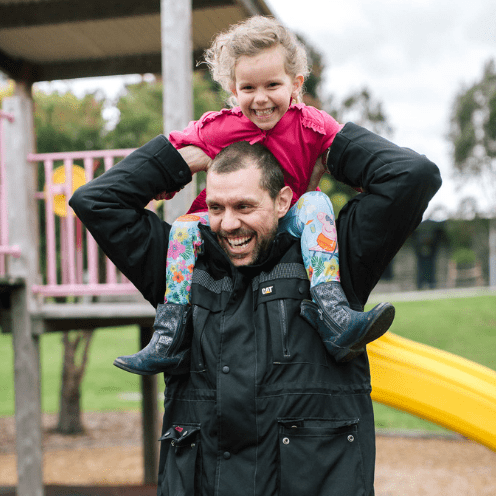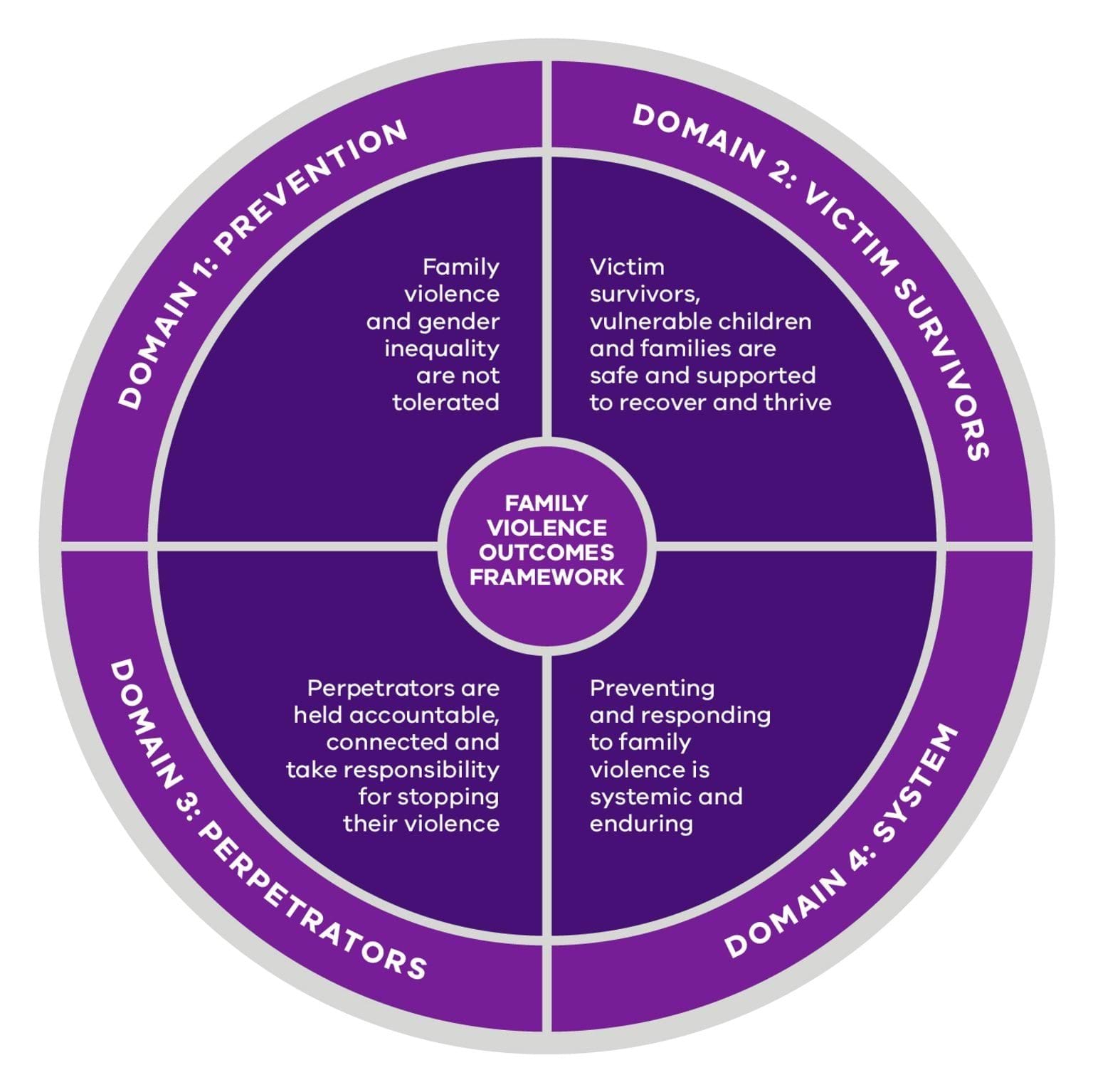Building momentum
A successful research and evaluation program will provide the information we need to make sure that funding for family violence initiatives is contributing to achieving outcomes and delivering value for money.
A strong and effective family violence evidence base is key to delivering long-term, sustainable reform of our family violence system. It tells us what is working, what needs to be adjusted, and where to focus our efforts for the greatest effect.
Building the evidence base for such broad ranging reforms is a long-term project.
- Our early focus has been on building evaluation rigour and capability, to strengthen the body of evidence and to use this knowledge to drive future service design and delivery.
- We are turning our efforts to research activities that fill gaps in our evidence base across prevention, early intervention and response.
- Improving the quality, availability and use of data underpins our research and evaluation activities and is critical in driving improvement.
Over the next three years we will build a stronger evidence base by coordinating and expanding research, data and evaluation activities working across government and in partnership with the prevention and response sectors and academia.
A Victorian Government Family Violence Research agenda and program will support the whole of government approach to research on family violence across primary prevention, early intervention and response.
A clear, coordinated research program with partners will reduce duplication, identify and prioritise gaps, support knowledge transfer and inform policy and practice.
This will help us in measuring how we are going against the outcomes in the Family Violence Outcomes Framework and give us valuable information to help us in the design and delivery of the reform.
Improvements to research and evaluation will deliver:
- a better understanding of how to prevent family violence before it happens
- knowledge of where to intervene early for the greatest impact
- an effective way to understand and show reform progress and impacts
- an evidence base to support us to effectively direct resources to the responses that make a difference
- strengthened culturally safe programs
- a platform to share achievements and lessons
It's a 'learning all the time' curve - it will probably never stop.
Progress since 2016
We have been building capacity and capability to improve data collection, research and evaluation across the reform.
The individual priority areas in this Rolling Action Plan include further detail on relevant research, evaluation and data collection, and report progress in delivery.
The key research and evaluation activities which have been delivered since the Royal Commission are grouped here into three areas.
1 Research and evaluation of key reform initiatives
Effective research and evaluation help us understand where we can focus and improve our reform delivery.
These are examples of evaluation projects and research programs across the reform.
2 Data collection and reporting
We are:
- improving the quality of our data
- making it more widely available across government and the sector
- establishing systems and frameworks to support data collection and reporting across prevention and response
3 Building evaluation capability
We have been building capability and capacity to undertake effective research and evaluation.
For example, the Department of Justice and Community Safety (DJCS) is:
- developing policy and guidelines for evaluation of family violence initiatives
- developing accessible staff learning resources
- sharing learnings and findings of evaluation outcomes across government
The DJCS Koori Justice Unit has been working with Aboriginal community-controlled organisations to build capacity to conduct evaluations.
Delivery to 2023
Over the next three years we will continue to strengthen the family violence evidence base.
We will do this in partnership with the sector and through cross-government activities that build on current momentum and support continuous improvement. We will also target identified information gaps to build evidence in individual programs, initiatives and reform areas.
Collectively, these activities will enable continuous improvement cycles that support evidence-informed policy making to translate to effective services and initiatives that achieve outcomes.
This overview of our planned research and evaluation activities to 2023 is grouped into four areas. Additional research and evaluation activity supporting the reform is also reflected in the web pages for each priority.
1. Measuring change against a refreshed Family Violence Outcomes Framework
We are measuring and monitoring change against the Family Violence Outcomes Framework to understand the impact of the reform.
Our focus on measurement and monitoring is intended to build the validity and reliability of our outcomes data over the next three years.
We have released the Family Violence Outcomes Framework (FVOF) Measurement and Monitoring Implementation Strategy to continue to improve our data collection and measurement against the FVOF.
2. Progressing research on family violence
Greater transparency and collaboration would enable organisations working in the family violence sector to identify key research gaps and minimise duplication.
Across family violence prevention, early interventions and response we are working with Victorian universities, industry and agencies to build research partnerships that:
- draw on our respective strengths
- drive collaboration
- support information sharing
- help turn research into policy and practice
As part of our work to better understand the drivers, presentation and risk for all forms of family violence in Victoria, we will identify and target research into priority evidence gaps.
3. Monitoring and evaluation of service delivery and response
Government will continue its focus on monitoring and evaluation of programs and initiatives across the reform. Rigorous and high-quality monitoring and evaluation helps us to understand what works in preventing and responding to family violence.
4. Building data quality and availability
Improving the quality, availability and use of data is key to driving continuous improvement and underpins effective research and evaluation.
We are working across government and with the sector to strengthen data collection practices and to enhance and refine data systems. We are also improving how we share and use existing data by expanding routine reporting.
Examples of data quality and availability improvement work are outlined below:
Connecting research and evaluation across the reform
Activities in this priority area support, and are equally supported by, delivery more broadly across the family violence reform.
Reform-wide priorities
Research and Evaluation activities are informed by our reform-wide priorities of intersectionality, Aboriginal self-determination and lived experience.
Intersectionality
Targeted research will help us better understand the impacts of structural inequality and overlapping forms of discrimination or disadvantage, and ultimately help us create inclusive and equitable services and responses.
We will focus on working with the sector to improve data collection and build the evidence base for people from diverse communities. We will also continue to improve and refine data collection systems to make collection of key demographic information easier and more consistent.
The Everybody Matters, Inclusion and Equity Statement highlights significant gaps in research and data collection around access, inclusion and responsiveness to diverse communities.
Respect Victoria will release an intersectionality approach, including policy and guidance to improve data collection and research methods to inform our knowledge of the intersections between the drivers of violence.
Several research and evaluation projects across the reform that address intersectionality are outlined in Delivery to 2023 on this page.
Aboriginal self-determination
To build an evidence base, the Dhelk Dja Partnership Forum has a strategy to monitor the performance of key initiatives, programs and actions. The Monitoring, Evaluation and Accountability Plan will support the Aboriginal-led data collection, research and evaluation agenda.
The plan:
- sets out a monitoring and evaluation strategy for the Dhelk Dja Partnership Forum
- oversees performance monitoring of key self-determination initiatives, programs and actions on a three-year cycle alongside action plans in the Dhelk Dja agreement
- supports annual reporting to the Dhelk Dja Partnership Forum following development of indicators to inform progress and strategic decisions about priorities
Lived experience
It is important that research across the reform hears and learns from voices of lived experience including children, in the collection and use of data, evaluation and research.
This is an evolving commitment as we deliver more initiatives.
Family Safety Victoria will prioritise research that embeds the voices of lived experience, and Respect Victoria’s victim survivor engagement plan is a strategy to ensure that lived experience is considered in policy and research development.
The Orange Door network continues to implement and refine routine capturing of client voice and using client voice data to inform continuous improvement.
Measuring outcomes
Ongoing data development, targeted research, and evaluations of reform activity will improve the evidence base and enable reporting of progress towards outcomes.
The Family Violence Outcomes Framework (FVOF) is the tool we are using to measure how we are doing. The FVOF was first published in the 10-year plan which described it as:
…a tangible tool to keep us accountable...measuring outcomes will provide evidence of what works –and what doesn’t – in delivering real and meaningful change.
The 4 FVOF domains convey the ambition of the reform and shape the design and priorities outlined in this Rolling Action Plan.
- They reflect the long-term outcomes sought through the collective efforts of the reform.
- They represent the key priorities in preventing and responding to family violence.
- They establish what will constitute success.
Our research and evaluation activities have an impact across all four domains, as we strengthen the family violence evidence base and use that to better understand reform outcomes.
Royal Commission recommendations
The Victorian Government has committed to implement all 227 recommendations from the Royal Commission into Family Violence.
Of the recommendations still in progress, four relate to Research and Evaluation.
Summary of activities to 2023
Updated


